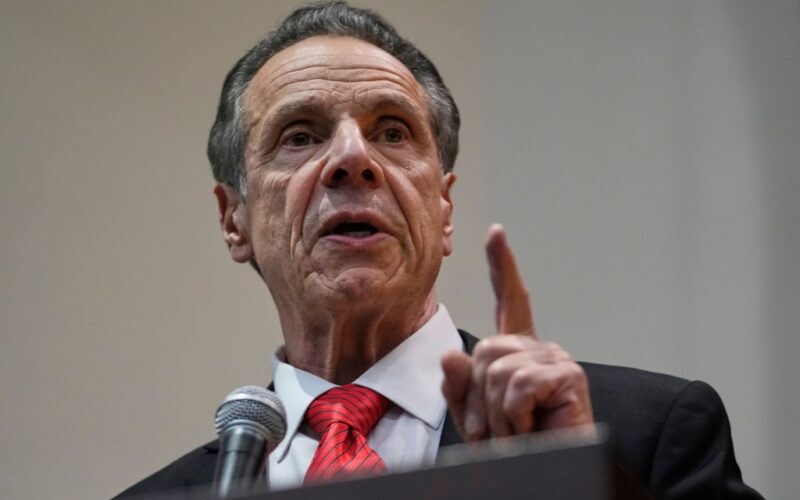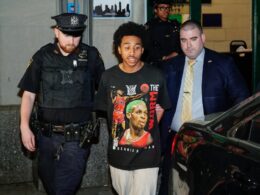Since announcing his bid for City Hall nearly three months ago, frontrunner Andrew Cuomo has only attended mayoral forums where candidates are quizzed by moderators one-at-a-time — a key component of a campaign strategy that has largely shielded him from public clashes with his opponents and unscripted questions from the press.
That approach has allowed Cuomo to avoid tangling directly with opponents and the press on fraught issues like his resignation over sexual harassment allegations and nursing home deaths during the pandemic, instead allowing him to more tightly control his narrative.
“This is a classic Rose Garden strategy,” said Trip Yang, a Democratic strategist who isn’t involved in any mayoral campaigns this year. “Cuomo is ahead by three touchdowns with three minutes left in the game, so he’s trying to run out the clock without taking incoming.”
Out of four forums the former governor has attended — the United Federation of Teachers’ forum this past Saturday, the Black Agenda forum in Crown Heights last month, the National Action Network forum in early April and a Washington Heights forum in late March — he and the other candidates each appeared alone on stage for questioning by moderators.
That stands in contrast to other forums where the candidates sit side by side in a mini-debate setting. Though moderators control questioning during such forums, too, candidates have a tendency to end up chiming in on each other’s answers when seated next to each other.
In addition to avoiding traditional forums, Cuomo, who’s polling as the clear favorite to win next month’s Democratic mayoral primary, generally doesn’t host news conferences, rarely takes questions from the press and sparingly releases public schedules ahead of appearances. Even for major policy plan announcements, Cuomo’s camp has sent out releases instead of holding a formal announcement.
Asked why Cuomo doesn’t show up to forums that have the traditional format, his spokesman Rich Azzopardi said only political “insiders” are focused on that issue and referred to remarks the ex-governor made on April 28.
“Everyone campaigns a different way, this is what I think is most effective,” Cuomo told reporters then. “I want to talk to the people of this city in a real-life environment, not in a staged forum with special interests where the audience is selected.”
Cuomo’s campaign and a supportive super PAC have spent millions of dollars on television and digital ads pitching him as a strong leader can turn the tide on a city in “crisis.”
Ahead of Rev. Al Sharpton’s forum in April, organizers switched out their original plan to have all the candidates appear at once in lieu of separate appearances, campaign sources told the Daily News. The same thing happened before a Crown Heights mayoral forum in April, Politico reported.
Yang, the strategist, said there’s a potential downside to Cuomo’s public appearance strategy, though.
“The con in putting the candidate in bubblewrap for this long is that it’s going to be a lot of emotions heading into the debates, and keep in mind that Cuomo has not been tested in a debate setting since 2018,” he said. “That’s a long time without practice.”
The first debate in the Democratic mayoral primary is set for June 4. That will likely be the first time Cuomo faces off against his opponents all at once.

Cuomo’s strategy has led his competitors to accuse him of running from his record.
Zohran Mamdani, who is consistently polling as the runner-up to Cuomo, said it appears the former governor has made the unusual one-candidate-at-a-time approach a condition for him to participate in forums. He said the first time he even saw Cuomo in person was during last weekend’s UFT forum, when he stepped onto the stage as Cuomo exited.
“Andrew Cuomo is running [a campaign] where every single interaction is scripted and coordinated and controlled and it’s reminiscent of his style of leadership as the governor of the state, and it all comes back from an analysis from his own team that the more time he spends in public the weaker his campaign becomes, because it’s a campaign built upon a fiction on a mythology of competence,” Mamdani told The News on Sunday.
The candidate said Cuomo is campaigning this way so he doesn’t have to “face up to his record” of creating an unpopular pension plan, cutting money from the MTA and the sexual harassment allegations, which he denies, from more than 10 women.
The former governor has been the frontrunner since entering the race in March, with a recent Marist poll showing a more than 20 point lead over Mamdani.
Political observers said the strategy is working to fend off any dents to that lead, while helping maintaining an air of being above the competition. It also mirrors Cuomo’s gubernatorial reelection strategy in 2018 and his move in 2021 to limit reporters’ access to him amid the sexual harassment allegations that lead to his resignation. Cuomo has denied those accusations.
“He doesn’t want to get beaten up all day,” Hank Sheinkopf, a Democratic strategist, said as explanation. “If he’s out there, he’s going to get beaten up. Why bother?”
To be more publicly available would also further legitimize his opponents, and “they become celebrities,” Sheinkopf said.








